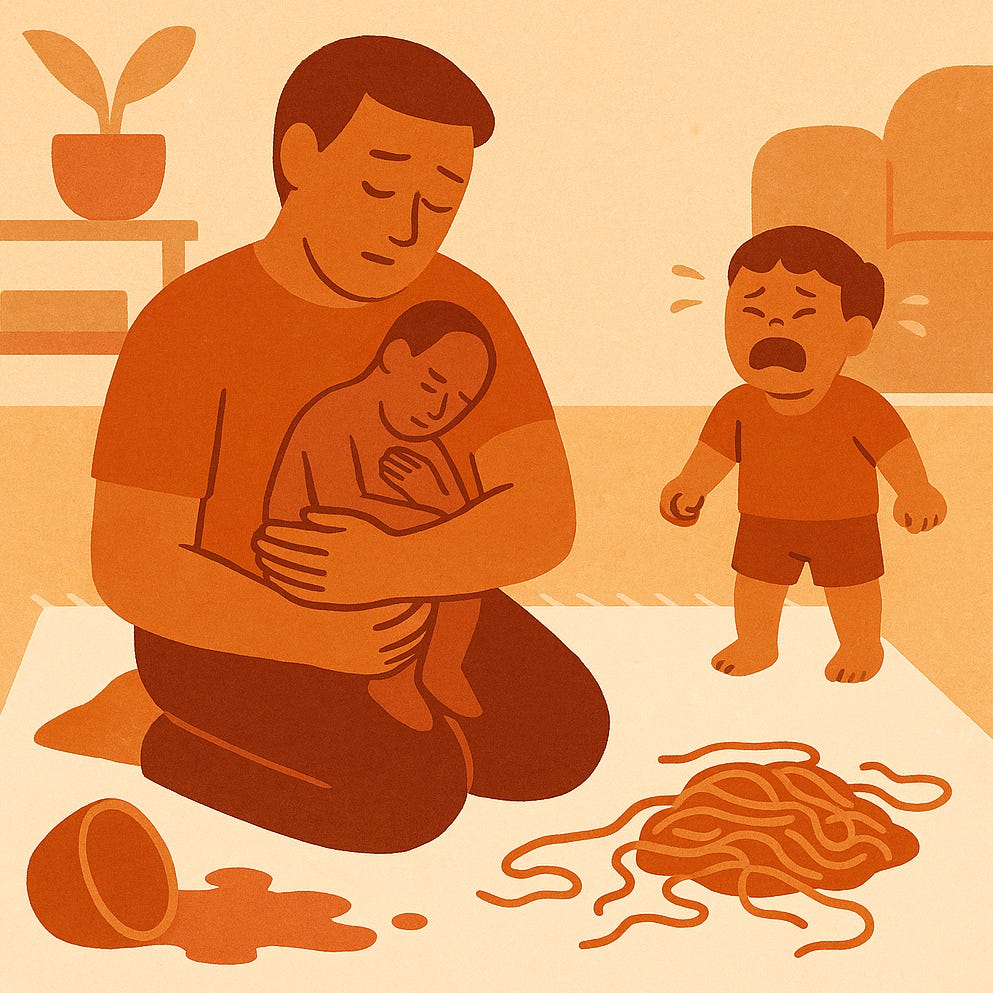Self-Compassion for Parents
Parenting can awaken our deepest love. And our oldest wounds. What happens when we meet ourselves with compassion in those messy moments?
As I was working on Part II of the Inner Critic’s Origin Story series, there was no way to avoid reflecting on my parenting successes and failures.
In my heart, I know that I’m an outstanding parent. I am doing my best to help raise healthy, happy, and securely attached kids.
But doing that hasn’t been easy. It’s involved a lot of deep, inner work to overcome my own traumas and attachment injuries. I made MANY mistakes along the way and continue to mess up on the regular.
As I wrote about how kids sponge up the emotional tone of their environment, take on everything as their fault, and use that to shape their sense of self, I couldn’t help but cringe.
I inherited my father’s volatility. His habit of yelling when he got dysregulated. His anxiety.
When I had kids of my own, it started to come out of me. It was as if I became a different person. It was scary and I didn’t like it.
I judged myself endlessly and harshly each time I inflicted it on my kids. This wasn’t the kind of parent I wanted to be.
The Unspoken Weight of Parenthood
Parenting is often described as some of the most meaningful work we’ll ever do. But for many, it’s also the most exhausting, confusing, and emotionally charged.
What most people don’t know when they have kids is that raising children is only one part of the game. They may also have to raise themselves in the process.
Parenting brings us face-to-face with our dysregulated nervous systems. Our relational wounds. Our unmet needs. And often, with a fierce and persistent inner critic that whispers (or sometimes shouts) You’re doing it wrong!
The Myth of the Perfect Parent
The dominant culture sells an impossible picture of parenthood. Ever-present. Always patient. Screen-free. Snack ready. Emotionally fluent.
We’re led to believe that if we read the right books, follow the right experts, and buy the right stuff, we’ll raise healthy, happy, securely attached kids.
If that’s not working out, the unspoken message is. It’s our fault. We’re failing.
But, we can’t self-criticize our way into being more loving parents. That strategy collapses under the weight of real human experience.
The Inner Critic in the Parenting Role
If there’s anything that can make our inner critic get stronger, it’s parenting.
It says things like:
“You’re too impatient.”
“You just did what your mother/father used to do.
“You should know better.”
If your inner critic is strong, it might even say you're worthless for yelling at your kid because they spilled spaghetti all over the white rug as you’re frantically trying to get out the door for soccer practice.
This happens because many of us are parenting from our own places that were never fully or properly parented. Survival strategies we developed in childhood—like people-pleasing, hypervigilance, or suppressed emotions—shaped our nervous systems.
In stressful life moments, the critic rushes in to protect us. To ensure we don’t mess up the love we have. So we don’t get rejected and kicked out of the group.
But as with all survival strategies, what once helped us cope may be hurting us and our kids in the present.
In a job as tough as parenting. Amidst a society that demands too much. Perhaps the most radical act we can undertake is to offer ourselves compassion as parents.
What Self-Compassionate Parenting Looks Like
Contrary to popular belief, self-compassion isn’t indulgence.
It’s not saying, “It’s fine that I yelled.” It’s saying, “That was hard. I lost my cool. And I’m still worthy of love.”
It makes room for repair. For softness. For caring for the scared part of us that still believes we’re only lovable if we get it all right.
Here are some examples of self-compassionate parenting:
Taking a breath before reacting, and saying inwardly: “This is hard, for both of us.”
Modeling humility by apologizing to your child when you mess up.
Talking to yourself like you would a good friend: “You’re tired. You’re trying your best. That moment doesn’t define you.”
I had to own that I was acting out an old nervous system imprint. I was reenacting a pattern that wasn’t mine to begin with. It wasn’t my fault. And I was trying my best to be a good parent in any given moment.
Breaking the Inheritance of Shame
Every generation hands down something to the next: habits, beliefs, emotional patterns. But, if we’re lucky, we get to decide what we pass on.
Practicing self-compassion as a parent isn’t just for you. It’s for your children, too. Because how you treat yourself becomes part of their emotional blueprint.
When they see you honour your limits. When you take responsibility with grace. Or soften towards yourself in hard moments. They learn how to do the same.
A Closing Note from an Imperfect Parent
It took me many years of therapy and doing the deep somatic work of reprogramming my nervous system to curb the habit of yelling at my kids.
That work also included a lot of self-compassion. The cumulative shame I lived with from all the years of mistakes was a huge weight on my shoulders.
I had to own that I was acting out an old nervous system imprint. I was reenacting a pattern that wasn’t mine to begin with. It wasn’t my fault. And I was trying my best to be a good parent in any given moment.
And, when life gets stressful, I still yell sometimes. I still don’t like it. I still regret it afterwards.
But now, I can meet myself with compassion in the present moment. “This is hard right now.” “I’m doing my best.” “I can reset and start over.” I can deeply feel that self-compassion in my body. It makes everything easier.
It also helps keep the shame from accumulating. But most importantly, it lets me bounce back quicker, and I can return to being the loving, responsive parent I know I really am.





Parenting revealed parts of me I thought I’d outgrown. Rage. Reactivity. Shame. I used to think that yelling made me a bad mom. But over time, I’ve learned that rupture followed by repair can be just as powerful as getting it "right" the first time. What you wrote here reminds me that self-compassion isn’t a loophole, it’s the path. Thank you for your honesty and wisdom.